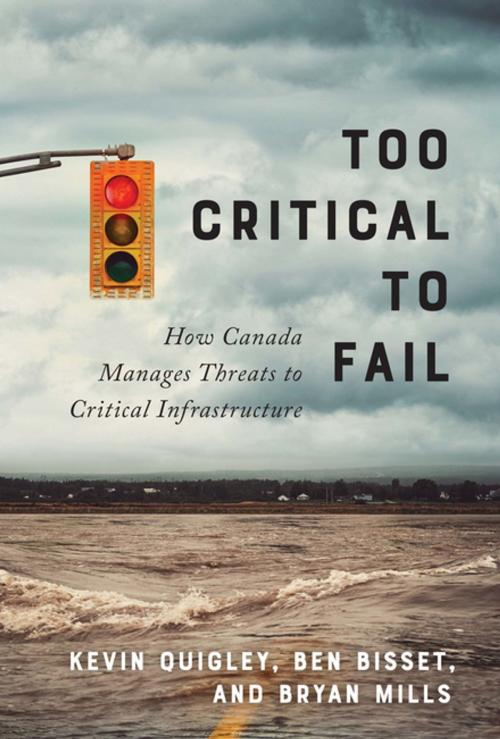Too Critical to Fail
How Canada Manages Threats to Critical Infrastructure
Nonfiction, Social & Cultural Studies, Political Science, Government, Public Affairs & Administration| Author: | Ken Quigley, Ben Bisset, Bryan Mills | ISBN: | 9780773552609 |
| Publisher: | MQUP | Publication: | November 30, 2017 |
| Imprint: | MQUP | Language: | English |
| Author: | Ken Quigley, Ben Bisset, Bryan Mills |
| ISBN: | 9780773552609 |
| Publisher: | MQUP |
| Publication: | November 30, 2017 |
| Imprint: | MQUP |
| Language: | English |
In the summer of 2013, just as a small town in Quebec was decimated due to a train derailment, heavy rainfall prompted thirty Alberta communities to declare a state of emergency. Whereas a SWAT team surrounded train conductor Thomas Harding and brought him to court where he was charged with the deaths of forty-seven in Quebec, Calgary mayor Naheed Nenshi emerged from the Alberta crisis as a folk hero. As the Lac-Mégantic train derailment and the flood in Alberta demonstrate, political, economic, legal, and cultural climates influence the way disasters are received and managed. In Too Critical to Fail, Kevin Quigley, Ben Bisset, and Bryan Mills identify the social context that shapes the Canadian government’s ability to prepare for and respond to emergencies. Using original research on natural disasters, pandemics, industrial failures, cyber-attacks, and terrorist threats, the authors evaluate the risk regulation regimes that monitor, interpret, and respond to failures in Canada’s critical infrastructure to limit their possibilities and consequences. More broadly, this book identifies key vulnerabilities and regulatory challenges for both the government and the private sector in mitigating threats to safety and security. Too Critical to Fail applies an investigative lens to the multiple and competing risks that the government balances to secure assets that enable modern civilization. Raising questions about Canadians’ ability to protect critical infrastructure and respond to threats, this book challenges the biases that determine who is held to account when the system fails.
In the summer of 2013, just as a small town in Quebec was decimated due to a train derailment, heavy rainfall prompted thirty Alberta communities to declare a state of emergency. Whereas a SWAT team surrounded train conductor Thomas Harding and brought him to court where he was charged with the deaths of forty-seven in Quebec, Calgary mayor Naheed Nenshi emerged from the Alberta crisis as a folk hero. As the Lac-Mégantic train derailment and the flood in Alberta demonstrate, political, economic, legal, and cultural climates influence the way disasters are received and managed. In Too Critical to Fail, Kevin Quigley, Ben Bisset, and Bryan Mills identify the social context that shapes the Canadian government’s ability to prepare for and respond to emergencies. Using original research on natural disasters, pandemics, industrial failures, cyber-attacks, and terrorist threats, the authors evaluate the risk regulation regimes that monitor, interpret, and respond to failures in Canada’s critical infrastructure to limit their possibilities and consequences. More broadly, this book identifies key vulnerabilities and regulatory challenges for both the government and the private sector in mitigating threats to safety and security. Too Critical to Fail applies an investigative lens to the multiple and competing risks that the government balances to secure assets that enable modern civilization. Raising questions about Canadians’ ability to protect critical infrastructure and respond to threats, this book challenges the biases that determine who is held to account when the system fails.















